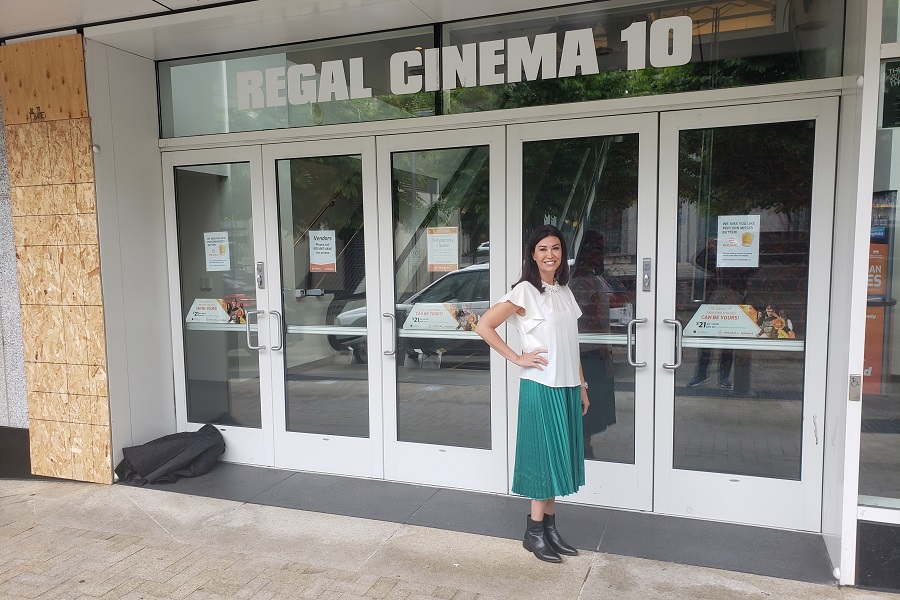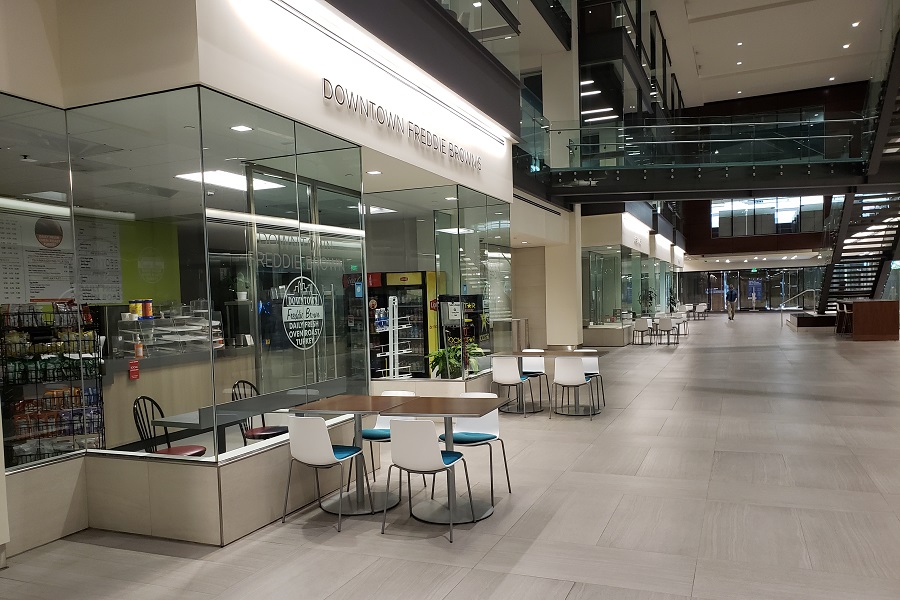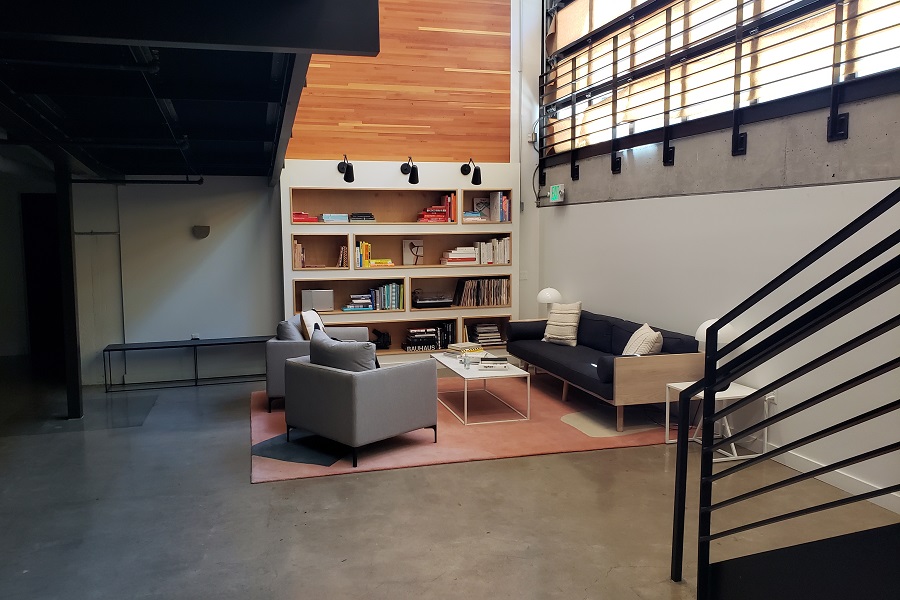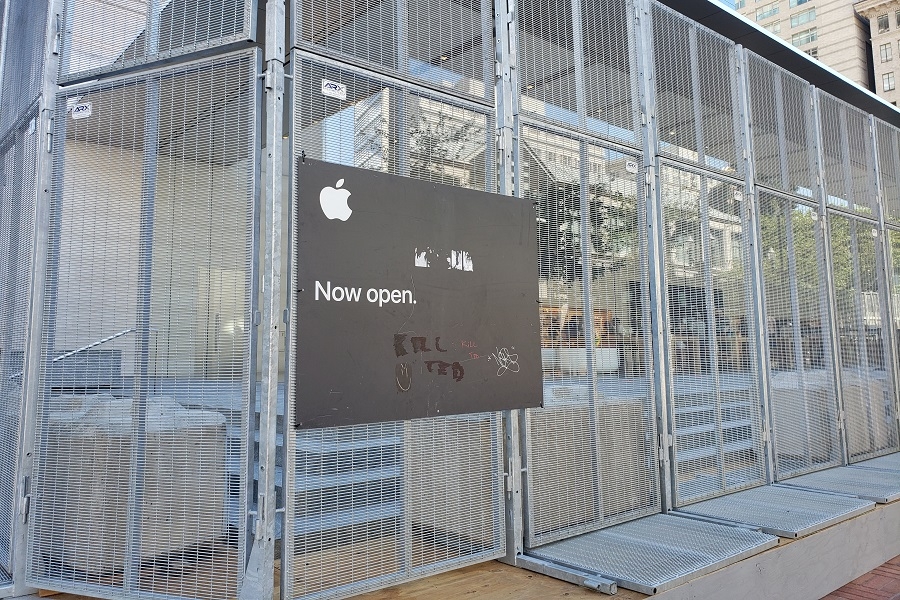The city center could look much different after its recovery.
Vanessa Sturgeon, co-founder of the Rose City Downtown Collective and CEO of commercial real estate firm TMT Development, had palpable excitement in her voice as she discussed downtown Portland’s future. We sat on leather chairs in the cavernous, largely empty lobby of high-rise office building Fox Tower, which TMT owns.
Despite a multitude of factors working against downtown, Sturgeon was certain things were going back to normal.
She had reason to be optimistic. Earlier that week, Regal Cinemas, Fox Tower’s ground-floor tenant, renewed its lease, despite suffering $1.6 billion in losses in 2020. Accounting firm Moss Adams also renewed its lease.

Vanessa Sturegon, CEO of TMT Development, outside Fox Tower Credit: Sander Gusinow
But Portland’s real estate future is far from clear. Even as storefronts are renovated, businesses have been largely migrating away from the downtown. Large players, including Google, Airbnb and Microsoft have left. The Apple Store reopened, albeit with a riot-proof storefront and plenty of security.
The coalition of businesses forming The Rose City Downtown Collective have had success cleaning storefronts and advocating for business owners in City Hall. Sturgeon said she was pleased by Mayor Ted Wheeler’s new $5.7 billion budget, which includes $5.7 million for citywide clean-up and $5 million to provide shelter, jobs and sanitation stations to the homeless.
For some leasing companies, now is the time to find opportunities in the shifting real estate market.

Inside the lobby of the US Bancorp Building Credit: Sander Gusinow
Founded by Sturgeon’s grandfather in 1988, TMT Development has done business in Portland for three decades. After the civil unrest in Portland last summer, Sturgeon co-founded The Rose City Downtown Collective, a community action group of downtown business owners. Her group includes Moda Health, Deschutes Brewery and the Portland Trail Blazers.
RELATED STORY: Saving Downtown
The collective has raised more than $25,000 with its GoFundMe campaign, distributing the funds in $1,000 grants to businesses damaged during Portland’s civil unrest last summer. The group also held a trash clean-up event and continues to advocate for balanced public safety measures.
In addition to wanting a more visible foot and bike presence from the Portland Police Department, the collective demands the cessation of tear gas and the use of impact munitions on peaceful protesters.
The collective’s success, both in raising finances and influencing policy, could not come at a more pivotal time. As businesses reopen, public-safety concerns could stand in the way of businesses making much-needed summer profit. If businesses continue to flee, commercial real estate prices could be forced down. Sturgeon says a drop in real estate prices is unlikely, and that new businesses will swoop in to fill vacancies in restaurant, hospitality and retail.
But Todd Gooding, president of commercial real estate developer ScanlanKemperBard, says a decline in rent is an economic inevitability.
“Rental rates are going to go down everywhere. It might not be showing up in the reports, but it’s happening now. There is a consistent difference in rental rates,” says Gooding, a 30-year industry veteran. “My gut tells me we’re in for a painful 2021 and first half of 2022.”

A communal study at the newly renovated Mason Erhman Building Credit: Sander Gusinow
Instead of banking on a swift return to business as usual, Gooding’s company is renovating the Mason Erhman Building Annex warehouse in Portland’s Old Town, an area where rates were lower even before the pandemic. Homelessness and drug use were a problem in Old Town long before 2020.
RELATED STORY: Insurance Woes Impede Recovery
Gooding expects tenants will seek to move farther away from Portland’s business district in the near future. He cites increased leasing activity in southeast Portland, Tigard and surrounding areas as examples of this phenomenon.
“What’s going to happen is some places feeling the squeeze are going to start offering leases at lower rates. Once they get low enough, companies will be willing to take a chance,” says Gooding, who is able to offer tenants low rates already, given the building’s location. “Many of the places in downtown are going for $36 per square foot. We’re more like $22.”
Mason Erhman Building Annex amenities will include a rooftop terrace, a shower room and a security detail to walk tenants to their cars.
While commercial real estate in downtown Portland could face a year of contraction, tenants seeking to capitalize on the cheaper market could favor places like Old Town instead of the business district. Ascendant Beer Company and the University of Oregon have already set up locations in Old Town, betting the area will come out of the rebuilding process better than before.
Sturgeon and Gooding agree that Portland will eventually recover. The only question is when and how many tenants will leave before it does. As businesses continue to migrate outside the business district, shops, restaurants and nightlife could follow. If pressure does eventually drive down rates, new businesses are likely to move in.
“We can afford to be patient,” says Gooding. “Sooner or later it will all come back.”
To subscribe to Oregon Business, click here.






